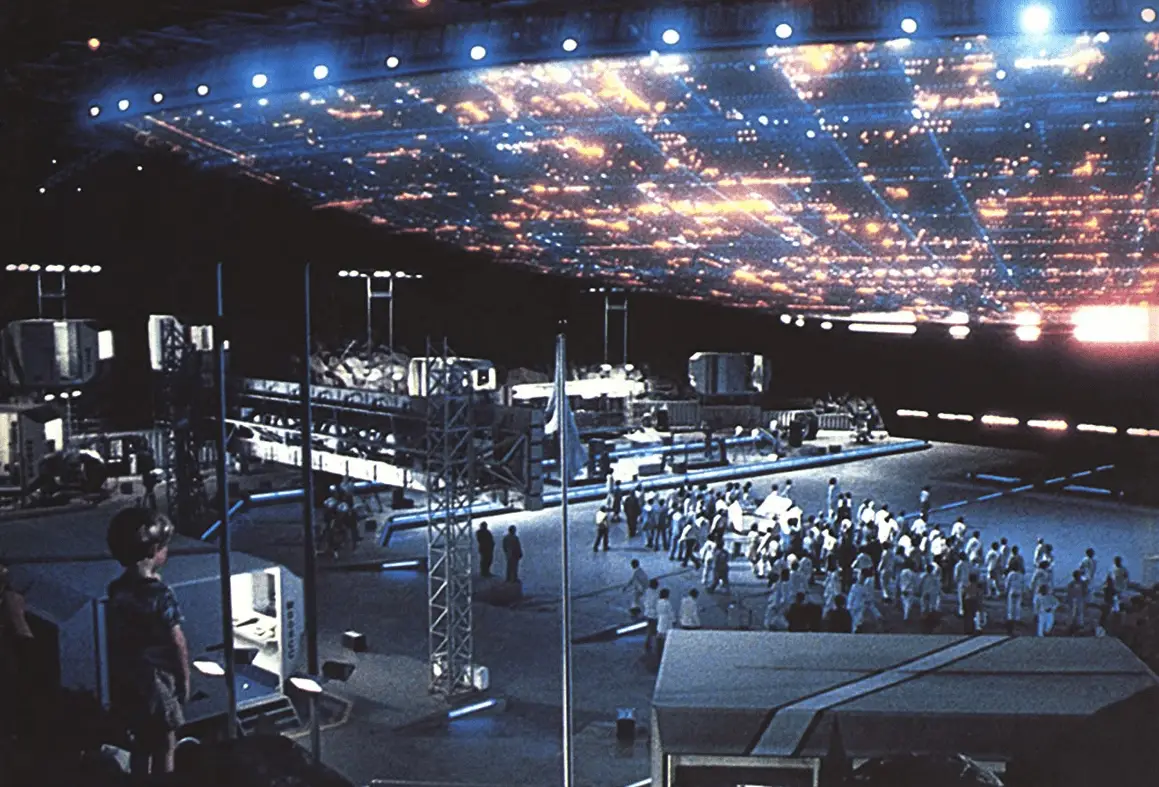Steven Spielberg’s classic 1977 film Close Encounters of the Third Kind told the overlapping tales of the journeys of two people: Roy Neary, a witness whose life was transformed by a UFO sighting, and Claude Lacombe, a scientist who discovers we are not alone. Astronomer and former scientific consultant to the Air Force’s Project Blue Book investigation program, J. Allen Hynek, brought his three decades of UFO research experience to the film, participated in its promotion, and even had a cameo in it.

J. Allen Hynek in “Close Encounters of the Third Kind”
Close Encounters‘ UFO investigator was a composite, and when Spielberg decided to make the character a bit “alien” himself, they changed him to a Frenchman and renamed him “Claude Lacombe,” casting Francois Truffaut in the role. Legend has it that Hynek’s associate, Jacques Vallee, was the model for Lacombe. However, Hynek’s biography, The Close Encounters Man by Mark O’Connell, recounts that when he was asked if Lacombe was based on a real ufologist, Hynek replied, “Right. Claude Poher. And yes, he does symbolically represent the scientific interest in the thing, so in that sense, I’m part of it.”
The story in Spielberg’s film was larger than life, but with slivers of fact. Close Encounters of the Third Kind was a pastiche of events and concepts taken from reports throughout UFO history. After teasing the humans for a while, the aliens sent Lacombe’s team coordinates on where to meet them, at Devil’s Tower, in Wyoming. To prepare for contact, military aerospace contractors hastily assembled dozens of scientists at the designated landing spot, and constructed a research station loaded with technological equipment, making it look a bit like a stadium.
That was the movies, but there’s a real-life UFO search effort underway right now. On October 19, 2017, astronomers discovered the first interstellar object to travel through the solar system, called ‘Oumuamua. Its apparent shape and behavior was unlike any known asteroid or comet, and when it zoomed off after swooping by the Sun, Professor Avi Loeb of the Harvard Astronomy Department suggested ‘Oumuamua might be our first ever recorded brush with alien technology. He’s been beating that drum ever since, and his 2021 book was titled Extraterrestrial: The First Sign of Intelligent Life Beyond Earth.
Last year, with the financial backing of Harvard and private supporters, Loeb set up the Galileo Project, searching “for extraterrestrial technological signatures of Extraterrestrial Technological Civilizations (ETCs).” To achieve that goal, Loeb’s been building a research team of scientists, supported by a scientific advisory board and research affiliates.
Science and ufology traditionally haven’t gotten along well. In 2021, Loeb told ufologist Kevin D. Randle that he was not interested in UFO history and previous research. “We are focused on assembling new high-quality data and not on past data,” Loeb said. Indeed, his website states that “the Galileo Project will not engage in retroactive attempts to analyze existing images or radar data, or speculate on prior UAP, observations or anecdotal reports …”
After the new wave of public interest in UFOs in late 2017, the topic has (re)gained a bit of respectability, pressuring the U.S. military and government to take the topic seriously. Loeb has embraced UFOs, at least under the new politically correct, Pentagon-approved vague terminology, UAP (“unidentified aerial phenomena”), and his many articles and media appearances about the Galileo Project are on the verge of making him the Dr. Fauci of UFOs.
Recently, despite his dismissal of old cases, Loeb invited several ufologists into his project, including commentator/entertainer Nick Pope, ex-government UAP advocates Christopher Mellon and Luis Elizondo (formerly affiliated with ex-blink-182 frontman Tom Delonge’s To The Stars Academy), and individuals from several UFO research organizations and enterprises. Most of them are included as “Research Associates,” but Garry Nolan and even Jacques Vallee (who views UFOs as interdimensional) have been put on the primary “Research Team,” alongside Loeb himself.
Loeb wants the Galileo Project to capture evidence of extraterrestrials with technological instruments. Essentially, he’s trying to get a good picture of a UFO. Since Loeb is willfully rejecting the history of UFO research, he’s apparently unaware that it’s not only been tried before, but that several independent efforts are underway now. One of them was UFOTOG, a photographic system created by Douglas Trumbull, who received a 1978 Best Visual Effects Oscar nomination for his work on, you guessed it, Close Encounters of the Third Kind.

Francois Truffaut as Claude Lacombe
So now the Galileo Project has a pantry full of Claude Lacombes. It remains to be seen if Loeb is more Galileo or Chicken Little with his search for intergalactic UFOs.
Every February, to help celebrate Darwin Day, the Science section of AIPT cranks up the critical thinking for SKEPTICISM MONTH! Skepticism is an approach to evaluating claims that emphasizes evidence and applies the tools of science. All month we’ll be highlighting skepticism in pop culture, and skepticism *OF* pop culture.
AIPT Science is co-presented by AIPT and the New York City Skeptics.
Join the AIPT Patreon
Want to take our relationship to the next level? Become a patron today to gain access to exclusive perks, such as:
- ❌ Remove all ads on the website
- 💬 Join our Discord community, where we chat about the latest news and releases from everything we cover on AIPT
- 📗 Access to our monthly book club
- 📦 Get a physical trade paperback shipped to you every month
- 💥 And more!














You must be logged in to post a comment.